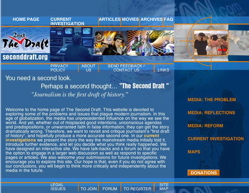History prof’s Web project calls for tougher scrutiny of news media
Richard Landes makes example of Palestinian propoganda

Journalists, it is often said, write the first draft of history. But what if the first draft is wrong?
That question — and others — lies at the heart of a new Web site, the Second Draft, launched in late September by Richard Landes, a CAS history associate professor of history and the director of BU’s Center for Millennial Studies. In the course of his research on apocalyptic movements in the Middle East, Landes became intrigued by the media images of violence that had become iconic to Palestinians involved in the Arab-Israeli conflict. When he learned of the possibility that some of the most brutal scenes had been staged, he decided to explore the issue more thoroughly.
“The whole point of the mainstream media is it’s supposed to be a kind of gatekeeper for sane discussion,” Landes says. “If they’re giving us a radically skewed version of what was going on, we’re going to make mistakes.”
Landes began his research with Mohammed al-Dura, a young boy allegedly killed by the Israeli Defense Forces in September 2000. The image of al-Dura, who was filmed hiding behind a barrel with his father as the IDF fired at Palestinians, had been broadcast around the world and “was operating in the Muslim world as a medieval blood libel,” Landes says, triggering a new wave of suicide terrorism.
Landes visited Israel and France throughout 2003 to view the sites filmed by the media and watch the original uncut footage of the incident, filmed by a French news organization. He was struck by the differences between what was shown on television and what was filmed before and after the news clip: bandaged young men walking around smoking cigarettes before being carried into an ambulance, or laughing and joking while supposedly in the midst of a gun battle.
The findings became the basis of the Second Draft’s first investigation, a short film entitled Pallywood. A separate investigation, which centers on al-Dura, will be posted on September 30, the fifth anniversary of the incident.
Despite his current focus on the Middle East, Landes doesn’t intend the Second Draft to be about the Arab-Israeli conflict; he is simply using these examples to point out the ways the news media can perpetuate misinformation. “In the past, the world was too big a place for any error to be that costly,” he says. “Now, it’s not a free ride. If you get the story wrong you can do enormous damage.”
He also hopes that the Web site, which has attracted a great deal of notice in online communities, will provoke others to do their own investigations. “There are other first drafts,” he says, “that need to be studied.”